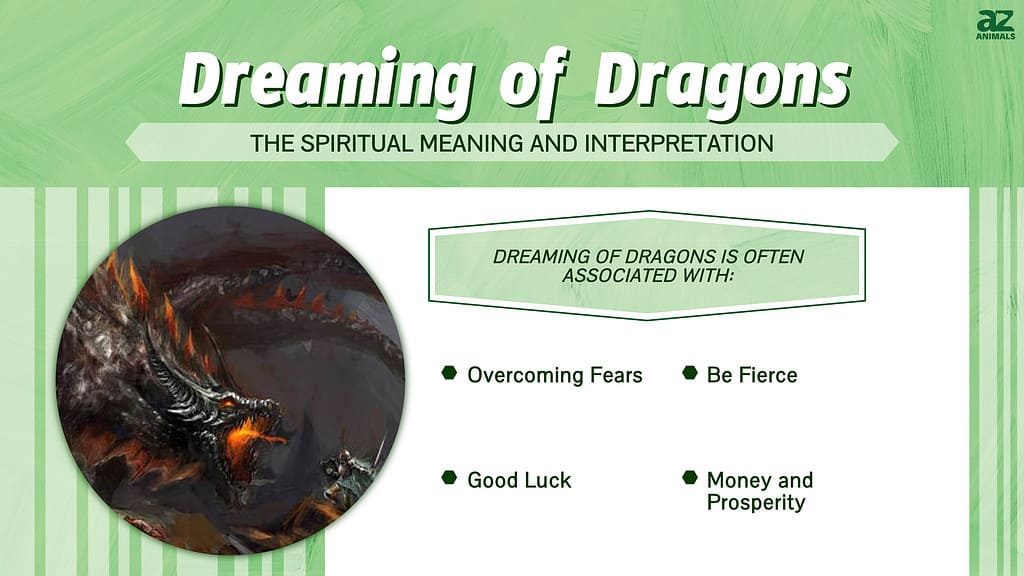
Dragons have long captivated the imaginations of both children and adults. This mythological animal holds significant symbolic meaning as they pull dreamers deep into a realm where fantasy intertwines with the subconscious. Dreams about these majestic creatures carry immense meaning and have been analyzed for centuries. But before diving into the spiritual meanings and interpretations of dragon dreams, we must first understand dreams.

Dreams are important because they prompt people to analyze their subconscious state of mind or repressed feelings.
©iStock.com/cyano66
First, dreams are a series of images, ideas, emotions, and sensations that our minds create while we sleep. Though they can happen anytime, they are most common during the REM (Rapid Eye Movement) sleep stage. This period is when the brain is most active. Making up about 25% of our total sleep time, experts believe people dream four to six times a night. The events of dreams, which occur involuntarily, play a vital role in helping people process memories.
Dreams allow people to better understand themselves. That is why some dreams help people confront their fears, process repressed thoughts and feelings, or make sense of life. They can also help you focus on areas or events that you have not consciously allowed yourself to address while awake. Though some dreams can be entertaining, disturbing, adventurous, or even bizarre, all dreams are meant to be reflective. Now, we will uncover the spiritual meaning and interpretations of dreaming about dragons.
Symbolism of Dragons in Various Cultures
Have you ever dreamt of dragons and wondered why? What could this seemingly medieval animal possibly mean concerning your own life? Well, you must first understand what this powerful creature epitomizes. People have portrayed dragons as magical serpentine creatures throughout history. While Asian cultures predominantly use dragons as symbols, legends and folklore across Europe, Africa, and the Americas also feature them. In Eastern cultures, humans perceived dragons as celestial creatures that brought benefits to their existence, and they treated dragons with respect and reverence. On the other hand, many Western cultures viewed dragons as evil, chaotic beings deserving of death. By analyzing the symbolism and cultural significance of dragons worldwide, we can better understand dream dragons.
Dragons in Asian Culture
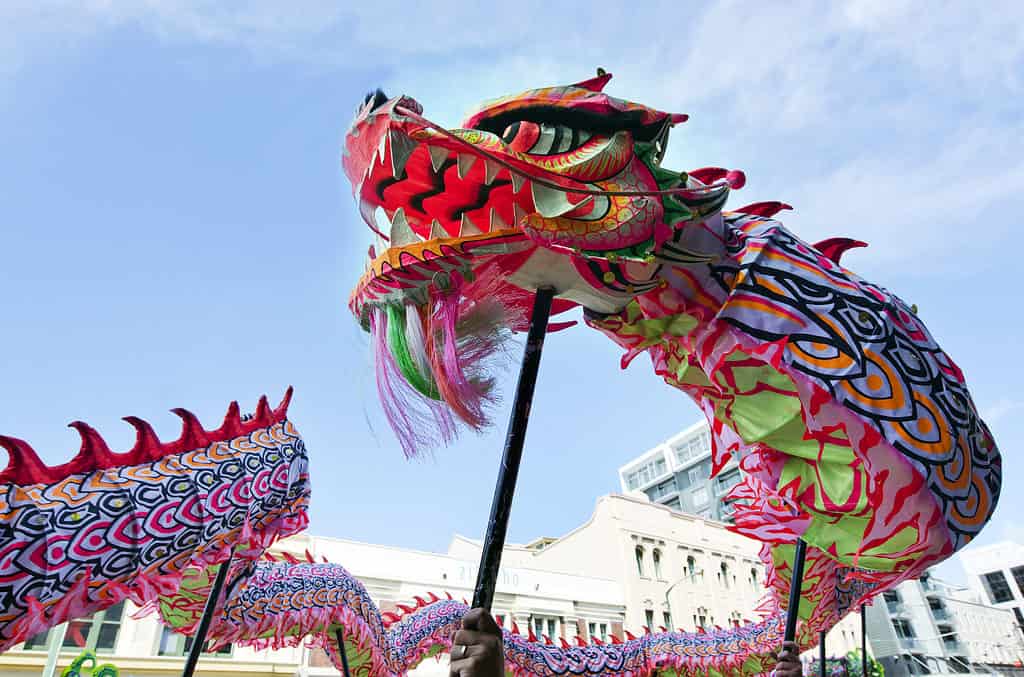
Traditional Chinese dragons are respected and worshipped throughout Asia.
©ChameleonsEye/Shutterstock.com
Throughout Asia, dragons are vastly important. In Chinese culture, the dragon is the fifth animal in their zodiac. It is unique because it is the only mythical creature in the Chinese zodiac. Chinese dragons represent good luck, strength, health, and the male element, Yang. They are said to have air powers, though they are often depicted as wingless creatures. In Korea, dragons usually have four claws — a number reserved for kings. In Vietnam, there are legends of a great dragon who guarded the country in ancient times. Dragons in Vietnam, as well as in Japan, Mongolia, India, and other Asian countries, are viewed as heroes due to the influence of this great warrior. These cultures generally perceive dragons as positive figures that symbolize power, wisdom, and peace. As a result, dreams featuring dragons are considered entirely positive, indicating good luck or the anticipation of favorable weather.
Dragons in European Culture
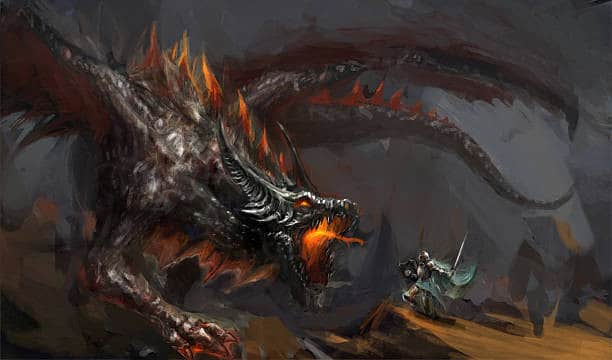
Dragons became a sinful image throughout Europe due to Christianity’s rise in popularity during the Middle Ages.
©iStock.com/fotokostic
In many European tales, dragons have a snake- or lizard-like body, two or four legs, and can breathe fire. They are also depicted as being able to fly. Scholars believe dragons evolved independently in Europe and China, leading to their vastly different interpretations and spiritual meanings. Dragons were mainly seen as symbols of evil due to the influence of Christianity on European culture. More specifically, they were representative of sin or Satan. They also have long been representative of wickedness and danger.
European dragons, often depicted as inhabiting dirty caves or nests, are also renowned for possessing marvelous treasures and guarding them with masterful precision. This directly influenced their image to represent greediness and selfishness. Epic poems from the Middle Ages describe dragons as ferocious creatures known to frequently prey on young girls. These stories also depict warriors and knights engaged in battles with dragons, often facing death for failing. The lucky few who emerged victorious earned fortune and honor.
Dragons in Native American Culture
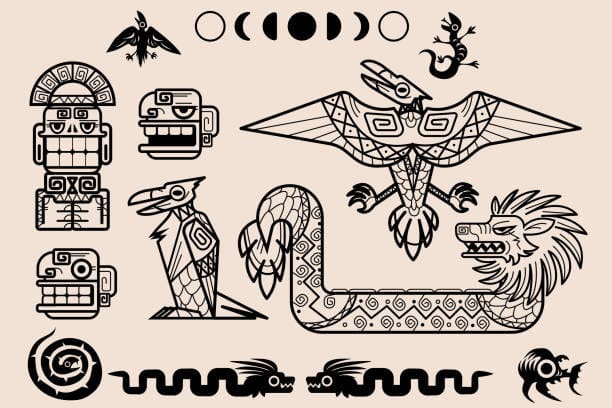
Many native tribes believed dragons were a sacred symbol that represented great knowledge.
©klyaksun/Shutterstock.com
In Native American culture, the dream space was a sacred place. This realm was important because it allowed people to step outside of the physical world and enter a place with a more universal consciousness. While each tribe had a different way of accessing this place, all tribes considered the dream messages as extremely important. They believed that dreams and all the symbols hidden within them came directly from the world ecology itself.
Referred to as the “Horned Serpent” by many different tribes, this title was the name of a common form of dragon commonly linked with water, rain, lightning, and thunder. Native American mythology features two notable dragons. The first, Gaasyendietha, was a fire-breathing creature from the Seneca tribe. Quetzalcoatl was a dragon mentioned in the Aztec nation. In the case of dragons appearing in dreams, natives considered it a symbol of wisdom and great knowledge. Dragons, respected and immensely powerful creatures, were associated with water, prosperity, and good luck. They were also seen as symbols of the creation of Earth, or death and resurrection.
Dragons in Ancient Egyptian Culture
In ancient Egypt, the dream world existed between two realms. These two places were the land of the living and the “other side” — a world inhabited by deities and the spirits of the dead. Egyptians believed dreams were a way of communicating with those entities. Their purpose was to warn the dreamer, foretell the future, give advice, or speak wisdom into them. Ancient Egyptians believed profoundly in the power and meaning of dreams that they had specific interpreters to help people understand the symbolism found within their dreams. They even had special rituals dedicated to evoking dreams!
To ancient Egyptians, dragons represented chaos and evil. They even have a god dedicated to them! Apophis, also called Apep, Apepi, or Rerek, was a serpent god representing chaos and all things outside the ordered cosmos. They threatened the underworld and frequently meant death. Dreaming of dragons was considered a bad omen or sign of evil.
Religious Interpretation of Dragons
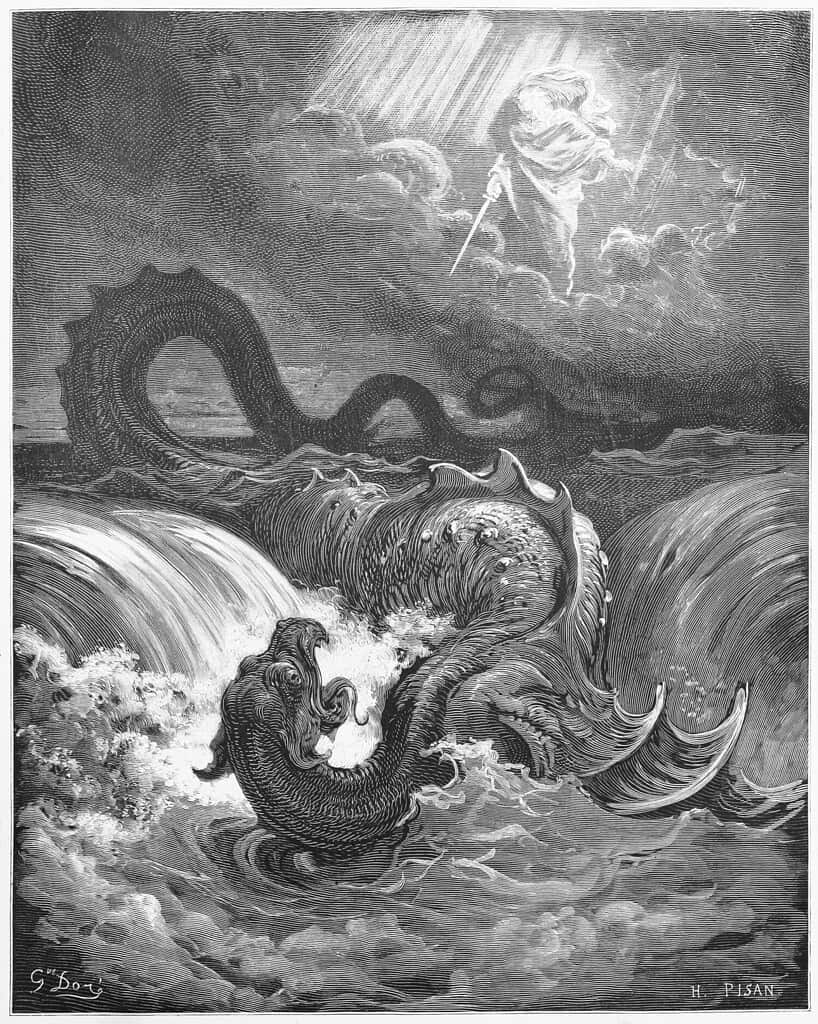
The Leviathan was a notable
sea dragon
in Christian, Jewish, and Middle-Eastern religious texts.
©Nicku/Shutterstock.com
Dragons in Religious Texts
Dragons are mentioned predominately in various religious texts, including the Bible. The Old Testament contains numerous stories that recount how God communicated with leaders, seers, and prophets through dreams. As evidenced by the stories of Joseph, Samuel, Daniel, and Balaam, dreams were thought to allow people to access divine wisdom. Though there is a variety of religious symbolism in dreams, dragons specifically hold significant meaning. They appear in Isaiah, Jeremiah, and Ezekiel and are sparsely noted in Deuteronomy and Nehemiah. Dragons are especially apparent in the New Testament chapters of Revelation 12, 13, 16, and 20.
In Revelation 12:3, a great red dragon appeared in Heaven with seven heads, ten horns, and seven crowns. In Revelation 20:2, Satan — referred to as a dragon — was bound for a thousand years. Revelation 13 describes a multi-headed dragon who emerges from the ocean and gives its immense power to a beast. In the King James version of the Bible, the term “tanniyn” appears 28 times. Translated, it means dragon or serpent. In this religious text, tanniyn almost always has a negative connotation and represents evil, sin, or someone who embodies those characteristics.
Interpreting Biblical Dragons
Dragons symbolize evil, chaos, or the opposition of God across almost all interpretations of the Bible. They are also associated with Satan or other demonic forces. In the Bible, dragons represent the feeling of fear associated with being subject to tyranny or harsh rule. Biblically, dragons are powerful, fearsome creatures who personify the chaotic struggle between good and evil, or virtue and sin. They have long stood as symbols of negativity or fear. They also represent the immense power of gods or god-like figures, including Satan. Alternatively, dragons appear to exemplify the limits of human strength and wisdom.
Expert analysts believe dreams with dragons signify the highest level of demonic attack against you or others. These dreams might suggest that sinful forces, or even the Antichrist, work against you. In a less extreme interpretation, biblical dragons in your dreams could represent negative, immoral thoughts or actions you are struggling with — consciously or subconsciously. These mythical creatures appearing in dreams can also symbolize your powerful solitary unconscious mind. A biblical interpretation of dragons in your dreams can mean that you are experiencing spiritual conflict or struggling between good and evil.
Characteristics of Dragons in Dreams
Dragons in dreams can have various spiritual interpretations based on their shape and size. Their color is another significant aspect linked to the dreamer’s unconscious emotions. Golden dragons are associated with wealth and fortune, while red dragons indicate a loss of control or passion. Green dragons can symbolize envy or greed and a purple dragon may represent spiritual enlightenment or personal growth. Though rare, a white dragon is viewed as an omen of good fortune or future wealth.
Most commonly, dream dragons appear as long, snake-like creatures with four legs, a long neck, and sharp claws. Dreaming of a three-headed dragon represents a powerful opposing life force. It can also mean experiencing an internal fight that will significantly impact your future. Like Cerberus in Greek mythology, this dragon type symbolizes the otherworld and represents the past, present, and future. Dragons can be depicted as creatures with wings that allow them to fly or swim. This type of dragon symbolizes that you are moving in the right direction or successfully overcoming obstacles that you face in real life. Alternatively, a winged dragon can represent a transformation or evolution to a higher level of maturity.
Suddenly Dreaming of Dragons

When you dream of dragons, look at the actions and situation of the dream for interpretation.
©Ground Picture/Shutterstock.com
Dragons are mythical creatures, which leads experts to believe dreams about them are especially significant for connecting the conscious and unconscious mind. Dream dragons commonly represent the physical manifestation of the dreamer’s inner psyche struggling with finding their true path. Which side of good vs. evil a dream falls within can depend entirely on the contents of the dream. What the dreamer does to, or how they interact with, the dragon is a major indicator of its meaning.
That said, suddenly dreaming of dragons indicates conscious or subconscious unresolved feelings. Dream dragons often manifest as a result of negative emotion, usually representing the untamed, fiery part of the dreamer’s personality. Common examples include anger, rage, hatred, vengeance, or resentment. In any culture, a sudden dream about a dragon implies things about challenges or hardships you will soon face or strong emotions you currently feel. You should consider your feelings and actions while facing your dream dragon. This is necessary to better understand your dream’s meaning.
Common Types of Dragon Dreams
Slaying the Dragon
Dreams featuring attempts to slay dragons are some of the most common dreams involving these mythical creatures. In these dreams, the dragon typically represents ultimate power. Your attempt to slay it indicates that your power feels threatened, or that you crave greater strength, potency, or leadership in real life. Alternatively, this type of dream may suggest that you are struggling to balance your emotions. It could also mean that two different parts of yourself are conflicting with each other.
If you are successful in slaying the dragon, it may be a sign that you are finally letting go of long-held grievances or resentments you have held towards someone or some situation. This victory may also indicate your desire to improve yourself, or your strong ambition to succeed. The dream may also symbolize your ability to confront someone about something that is bothering you, even if you have not spoken openly about it before. In essence, your dream characterizes you as a hero overcoming a big fear and achieving a significant victory. Although slaying a dragon can be heroic, repetitive dreams of doing so indicate a strong arrogance or selfishness that needs to be addressed.
If you fail to conquer the dragon in your dream, it could be a sign that you lack confidence in yourself, or your skills and abilities. It is crucial to pay attention to the meaning of this kind of failure in your dreams as it can offer valuable insights on how to improve yourself. Finding these solutions will help you enhance your self-confidence and stability. By doing so, you can cultivate spiritual growth and ultimately become the best possible version of yourself.
Controlling the Dragon
Dreams in which you are riding, flying on the back of, or otherwise controlling a dragon typically represent spiritual insight. It is vital to pay attention to these dreams because they indicate that you yearn for new experiences, adventure, or excitement in life. Controlling a dragon in your dream may indicate a willingness to take risks and try new things. According to experts, such dreams may also signify a desire to be a leader or hold a position of power. Dreams in which you are in control of the dragon can symbolize a transformative journey you are currently on. On the other hand, this type of dream may indicate that you are making progress towards realizing your full potential.
Protecting Others from the Dragon
Another common dream scenario involves dragons destroying your home or harming your loved ones. If you dream of trying to protect someone from a raging dragon, it may be a sign that you need to prioritize the things that matter most to you. This dream could also indicate that someone is threatening your loved ones or that they are in danger, even if you haven’t realized it yet. It may also mean that you need to protect your inner peace, knowledge, or spirit from people who have ill intentions towards you. Essentially, the dream dragon represents those in your life who do not have your best interests at heart. From a spiritual perspective, this type of dream could be a warning to be more cautious in trusting others, as it may lead to your downfall.
Other Dragon Dreams
Dragons may occasionally appear as neutral characters in your dreams. This often indicates that your life is stable and there is nothing to worry about or investigate further. While your cultural background can greatly influence this, a dragon in your dream that causes any harm or benefit may just be a random element from your subconscious. If you recently watched or read something about dragons while awake, your brain might also just be incorporating those experiences into your dream. Additionally, your dream may contain other symbolic elements besides the dragon. In this case, it is important to emphasize the more prominent elements of your dream. This will help you determine its true underlying spiritual meaning or interpretation.
Dealing with Dragon Dreams
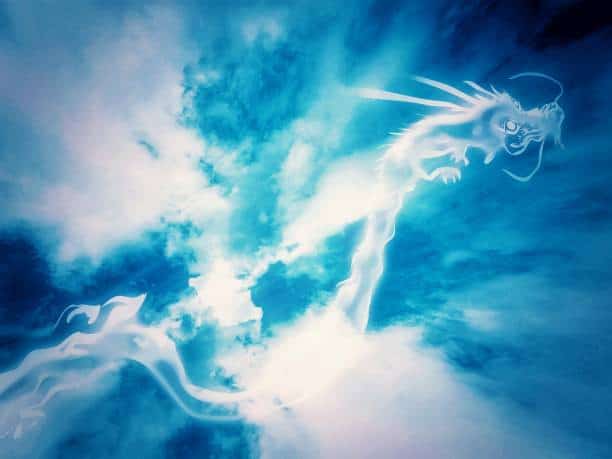
Paying attention to your dreams, especially those involving dragons, can help improve the quality of your life.
©koyu/iStock / Getty Images Plus via Getty Images
To put an end to recurring dreams about dragons, it is essential you gather as many clues as possible to understand the underlying feelings causing them. Start with an analysis of what the dragon represents in your life and how your actions against it can reflect what you need to do in real life. Pay close attention to your subconscious and conscious motives, thought patterns, drives, and instincts. By doing so, you can identify the root cause of the origin of your dragon and uncover the true problems you are facing. This will help you grow past it and conquer the battle within yourself, leading you to find peace within your life and your dreams!
Bottom Line
Dragons symbolize the immense power required to dive beneath the surface and emerge victorious with newfound awareness, clarity, or wisdom. Dreams about this creature indicate the need for a transformative quest to help you unlock your full potential. Even though dreams about dragons do not always represent evil or negative thoughts, they are always a clear sign that deep introspection is needed. This is primarily because these dreams indicate the need to come to terms with the actual, sometimes repressed, feelings in your subconscious. Although the dragon may be frightening or seem like you can never beat it, facing your fears in these dreams is always necessary to unlock your hidden potential, find inner peace, or achieve success.
Whether you are dreaming of dragons, serpents, or something else entirely, it is clear that dreams hold significant power and meaning. A window into the depths of the subconscious mind or inner psyche, all dreams deserve thoughtful attention. Therefore, it is essential to pay close attention to their contents. As a dreamer, knowing how to recognize and interpret the symbolism found within your dreams is crucial. In doing so, you will gain a deeper understanding of their spiritual meanings and interpretations, allowing you to better interpret the significance of each of your dreams.
The photo featured at the top of this post is © Ironika/Shutterstock.com
Thank you for reading! Have some feedback for us? Contact the AZ Animals editorial team.






